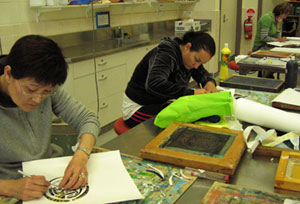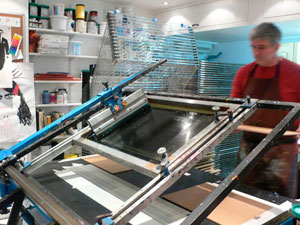Screen Printer
Tasks & duties

Screen printers may do some or all of the following:
-
discuss design requirements with clients
-
contribute to the design of a product
-
arrange colour-matching and sampling with the original design
-
determine the type of screen to be used for the screen printing
-
place the stencils on the mesh screen
-
place the screen on the materials to be printed and add the ink
-
leave the ink to dry and add the other colours
-
clean the screens and equipment
-
check the quality of the screen-printed products
Skills & knowledge

Screen printers need to have:
-
knowledge of different screen-printing methods
-
the ability to make up inks and colours
-
knowledge of art and design
-
an understanding of different materials, particularly the properties of different fabrics
-
knowledge of how the final screen-printed product will be used, so they can design it appropriately
-
knowledge of the printing industry and screen-printing machinery
-
skill in the technical and practical aspects of screen printing
-
drawing skills
-
good listening and communication skills
-
good decision-making ability
-
problem-solving skills
Entry requirements
To become a screen printer you need to complete an apprenticeship and gain a National Certificate in Screen Printing.
Printing apprenticeships are part of the Modern Apprenticeships scheme. Modern Apprenticeships are for people aged 16 to 21 years old.
Those wanting to become factory screen printers must be at least 16 years old, have normal colour vision and pass an eyesight test.
Training on the job
Screen printers gain skills on the job. Apprentices attend short workshops and undertake a correspondence course while working. Their skills are assessed by a registered workplace assessor.
Useful experience
Work in the printing trade or in photography development is useful experience for screen printers.
Related courses
Fine Arts
Graphic Arts and Design Studies
For more information, please refer to Career Services.
Document Actions
